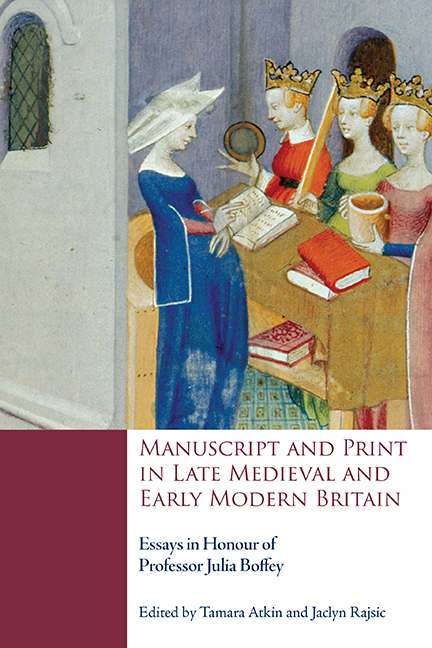 Manuscript and Print in Late Medieval and Early Modern Britain
Manuscript and Print in Late Medieval and Early Modern Britain Book contents
- Frontmatter
- Contents
- List of Illustrations
- List of Contributors
- Acknowledgements
- List of Abbreviations
- Introduction
- PRODUCING TEXTS
- READING INFLUENCE
- 8 Writing Revelation: The Book of Margery Kempe
- 9 ‘What strange ruins’: Reading Back to Thebes
- 10 Tyre in Africa: Dido's Flight and Sallust's Jugurtha
- 11 Trinitarian Piety and Married Chastity in The Pistel of Swete Susan
- 12 True Image? Alternative Veronicas in Late Medieval England
- 13 The Curelesse Wound: Henry Howard, Earl of Surrey and the Poetry of Blood
- Afterword
- Julia Boffey: A Bibliography
- Manuscript Index
- General Index
- Tabula Gratulatoria
9 - ‘What strange ruins’: Reading Back to Thebes
from READING INFLUENCE
Published online by Cambridge University Press: 06 September 2019
- Frontmatter
- Contents
- List of Illustrations
- List of Contributors
- Acknowledgements
- List of Abbreviations
- Introduction
- PRODUCING TEXTS
- READING INFLUENCE
- 8 Writing Revelation: The Book of Margery Kempe
- 9 ‘What strange ruins’: Reading Back to Thebes
- 10 Tyre in Africa: Dido's Flight and Sallust's Jugurtha
- 11 Trinitarian Piety and Married Chastity in The Pistel of Swete Susan
- 12 True Image? Alternative Veronicas in Late Medieval England
- 13 The Curelesse Wound: Henry Howard, Earl of Surrey and the Poetry of Blood
- Afterword
- Julia Boffey: A Bibliography
- Manuscript Index
- General Index
- Tabula Gratulatoria
Summary
ANCIENT THEBES IS A DEEPLY TROUBLING poetic emblem for medieval and early modern English writers. The foundational literary text, Statius's Thebaid, is a narrative of internecine violence, incest, rage, impiety and the sheer will to power. Medieval reworkings of the story of Oedipus and his rivalrous sons present Thebes as the enduring and unaccommodated challenge to the institutions, ideals and aristocratic identity, which were derived from its companion narrative, the story of Troy. In England, Geoffrey Chaucer's poetry offers the most important engagement with the tradition of Theban writing as both exemplary narrative and a source for continuing imitation and invention. Exemplarity and invention drive Chaucer's poems and carry forward to early modern treatments of Thebes. A substantial body of scholarship has tracked responses to Chaucer's poems through John Lydgate's Siege of Thebes to Shakespeare and John Fletcher's Two Noble Kinsmen and beyond. Those responses are at once conceptual adaptations and the evidence of historical reception. Within the chain of rewriting and invention what I propose to focus on is the option of reading backwards as well as forwards. The sixteenth- and seventeenth-century writers who retell Chaucer's Theban stories are in the first instance critical readers. They compose within protocols under which the idea of their works begins by searching for what remains undeveloped or unexpressed in their sources and intertexts. They consequently offer a historical lens of interpretation to supplement or challenge what modern criticism understands about Chaucer's poems.
Exemplary Thebes
As an exemplum, Thebes is part of the textual record of chivalry and the antithesis of its values. In his Confessio Amantis, John Gower tells the story of Capaneus, the blasphemous hero struck down by Jupiter on the walls of Thebes, as an example of ‘surquiderie’ (1.1977–2020). Thomas Hoccleve's ‘Remonstrance Against Oldcastle’ subtly alludes to Capaneus (‘Clymbe no more | in holy writ so hie’) yet lists Thebes in a roster of exemplary narratives that apply to ‘thordre of knyght’: ‘Rede the storie of Lancelot de lake, | Or Vegece of the aart of Chiualrie, | The seege of Troie / or Thebes / thee applie’ (lines 194–6).
- Type
- Chapter
- Information
- Manuscript and Print in Late Medieval and Early Modern BritainEssays in Honour of Professor Julia Boffey, pp. 167 - 182Publisher: Boydell & BrewerPrint publication year: 2019


